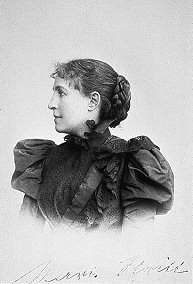Marie Stritt
Marie Stritt (1855–1928) was a German feminist and a leading force in the international and German women suffrage movement. She worked towards woman's education and fought against state regulated prostitution. Marie Stritt worked for changes regarding divorce laws through the Woman's Legal Aid Society. She was a big supporter of birth control and abortion.[1]
Marie Stritt | |
|---|---|
 | |
| Born | 18 February 1855 Sighișoara, Romania |
| Died | 16 September 1928 (aged 73) Dresden, Germany |
| Nationality | German |
| Occupation | Actor, Suffragist |
| Spouse(s) | [Albert Stritt
( m. 1879; died in 1908) |
Life
Stritt née Bacon was born on 18 February 1885 in Sighișoara, Romania. She had a career as an actor at the Badisches Staatstheater Karlsruhe. In 1879 she married fellow actor and opera singer Albert Stritt (1847-1908).[2]
Marie began her work in the late 1890s. She was an activist for many groups, including the women's group reform (1891) and the Women's Legal Aid Society (1894). These organizations were dedicated to fighting for women's rights to education equality and legal protection. Stritt was an important leader in the International Woman Suffrage Alliance (IWSA), whose goal was to work towards women's education and to oppose state-regulated prostitution.[1]
Marie Stritt one of the founders of the Co-Founders of the International Alliance of Women 1904 in Berlin, Germany. She was the chairperson of Bund Deutscher Frauenvereine from 1899 to 1910, the Deutscher Verband für Frauenstimmrecht from 1913 to 1919, and the International Alliance of Women from 1913 to 1920.[2]
Her activism did not end with her retirement from the board of the International Woman Suffrage Alliance; Marie continued to write and participate in journalism fighting for feminism issues for the remainder of her life.[1]
Stritt died on 16 September 1928 in Dresden, Germany.[2]
Literature
- Häusliche Knabenerziehung, Berlin 1891
- Frauenlogik, Dresden 1892
- Die Frau gehört ins Haus, Dresden 1893
- Die Bestimmung des Mannes, Dresden 1894
- Weibl. Schwächen, Dresden 1894
- Der Internationale Frauenkongress in Berlin 1904''
Notes
- "Stritt, Marie". Encyclopedia of Women Social Reformers - Credo Reference. Retrieved 2018-01-15.
- "Stritt, Marie; geb. Bacon". Österreichisches Biographisches Lexikon und biographische Dokumentation (in German). 2003. Retrieved 2019-08-05.